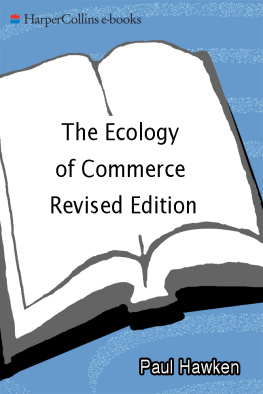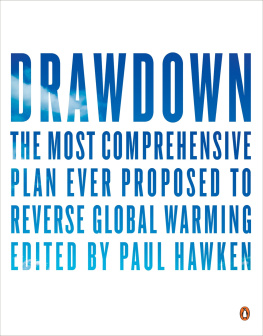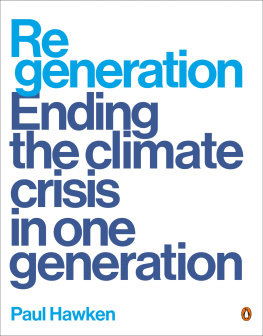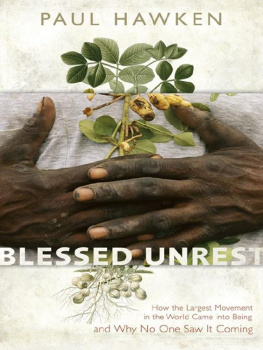Hawken - The Ecology of Commerce
Here you can read online Hawken - The Ecology of Commerce full text of the book (entire story) in english for free. Download pdf and epub, get meaning, cover and reviews about this ebook. year: 2013, publisher: HarperCollins, genre: Politics. Description of the work, (preface) as well as reviews are available. Best literature library LitArk.com created for fans of good reading and offers a wide selection of genres:
Romance novel
Science fiction
Adventure
Detective
Science
History
Home and family
Prose
Art
Politics
Computer
Non-fiction
Religion
Business
Children
Humor
Choose a favorite category and find really read worthwhile books. Enjoy immersion in the world of imagination, feel the emotions of the characters or learn something new for yourself, make an fascinating discovery.
The Ecology of Commerce: summary, description and annotation
We offer to read an annotation, description, summary or preface (depends on what the author of the book "The Ecology of Commerce" wrote himself). If you haven't found the necessary information about the book — write in the comments, we will try to find it.
Hawken: author's other books
Who wrote The Ecology of Commerce? Find out the surname, the name of the author of the book and a list of all author's works by series.
The Ecology of Commerce — read online for free the complete book (whole text) full work
Below is the text of the book, divided by pages. System saving the place of the last page read, allows you to conveniently read the book "The Ecology of Commerce" online for free, without having to search again every time where you left off. Put a bookmark, and you can go to the page where you finished reading at any time.
Font size:
Interval:
Bookmark:

For Ray Anderson
Contents
B ooks originate in strange moments and places. This one began in the Waldorf-Astoria ballroom in 1991. A company I founded had been nominated for the Council on Economic Priorities Environmental Stewardship Award. Although there were many environmental awards being handed out at that time, some of which were ersatz, CEPs tough stance on social and environmental responsibility gave the award some weight. The list of initiatives our company had taken was long, and we werent surprised to have been nominated, but when George Plimpton announced wed won, I walked to the podium, looked out at the sea of pearls and black ties, and fell mute. Instead of thanking everyone, I stood there in silence, suddenly realizing that my company did not deserve the award and that no one else did, either.
What we had done was scratch the surface of the problem, taken a few risks, put a fair amount of money where our mouths were, but in the end the impact on the environment was only marginally different than if we had done nothing at all. The recycled toner cartridges, the sustainably harvested woods, the replanted trees, the soy-based inks, and the monetary gifts to nonprofits were all well and good, but basically we were in the junk-mail business, selling products by catalog. All the recycling in the world would not change the fact that doing business today is an energy-intensive endeavor that gulps down resources.
I dont mean to decry the efforts made by companies to reduce their negative impact on the environment. I applaud them greatly. But it was clear to me in that moment that there was no way to there from here, that all companies were essentially proscribed from becoming ecologically sound, and that awards to institutions that had ventured to the environmental margins only underlined the fact that commerce and sustainability were antithetical by default, not by intention. Management is being told that if it wakes up and genuflects, pronouncing its amendes honorables, substituting biopolymers for polystyrene, we will be on the path to an environmentally sound world. Nothing could be further from the truth. The problem isnt the half measures but the illusion they foster that subtle course corrections can guide us to a good life that will include a conserved nature and expansive shopping malls. The companies that are changing their ways, reducing pollution, redesigning their products and methods of manufacture, have many different motives. In some cases, they would like to escape regulatory liabilities; some want to change their reputation with consumers; others would like to avoid perceived or future liabilities; and then there are those companies, mostly small, which are trying to fundamentally change the nature of business and move toward socially responsible commerce.
The problems we face are vast and complex, but they come down to this: we are 6.8 billion living together on one planet. The process of fulfilling our wants and needs is stripping the earth of its biotic capacity to produce life; a climactic burst of consumption by a single species is overwhelming the skies, earth, waters, and fauna. Every living system on Earth is in decline. Making matters worse, we are in the middle of a once-in-a-billion-years blowout sale of hydrocarbons. They are being combusted into the atmosphere at a rate that will effectively double-glaze the planet in the twenty-first century, with disastrous climatic results predicted by scientists. The cornucopia of resources that are being extracted, mined, and harvested is so poorly distributed that 20 percent of the earths people are chronically hungry, while another 20 percent, largely in the North, control and consume nearly 80 percent of the worlds wealth. Since business in its myriad forms is primarily responsible for this plunder, it is appropriate that a growing number of companies ask themselves, how do we conduct business honorably in the latter days of industrialism and the beginning of an ecological age? Companies are coming to realize that they may succeed according to conventional standards and still be violating profoundly important biological systems. The question is, can we create profitable companies that do not destroy, directly or indirectly, the world around them?
Many companies today no longer accept the maxim that the business of business is business. Their new premise is simple: Corporations, because they are the dominant institution on the planet, must squarely address social justice and environmental issues that afflict humankind. Nonprofit organizations such as Business Alliance for Local Living Economies (BALLE) and the U.S. Green Building Council (USGBC) consultants such as SustainAbility, Ltd., and Natural Logic, socially responsible investment companies like Portfolio 21, and thousands of family-owned companies are drawing up a new code of conduct for corporate life that integrates social, ethical, and environmental principles.
To create an enduring society we will need a system of commerce and production where each and every act is inherently sustainable and restorative. Business will need to integrate economic, biologic, and human systems to create a sustainable method of commerce. As hard as we may try to become sustainable on a company-by-company level, we cannot fully succeed until the institutions surrounding commerce are redesigned. Just as every act in an industrial society leads to environmental degradation, regardless of intention, we must design a system where the opposite is true, where doing good is like falling off a log, where the natural, everyday acts of work and life accumulate into a better world as a matter of course, not a matter of conscious altruism. That is what this book tries to imagine.
To transform commerce, we need to define honestly and forthrightly the array of problems we face. Chapters 13, 6, and 7 address this. These chapters are not litanies of environmental disasters; they are necessary prefaces to solutions. Although I think the problems we face are more severe than we realize, embedded in each problem is a realizable and crucial design solution. In order to achieve those solutions, we must begin with a set of objectives. I would start with these:
1. Reduce carbon emissions of energy 80 percent by 2030 and total natural resource usage 80 percent by 2050. This is not as difficult as it sounds. In material terms, it amounts to making things last twice as long using half the resources. We already have the technology to do this in every economic sector, including energy.
2. Provide secure, stable, and meaningful employment for people everywhere. The concept that moving toward environmental restoration is economically hazardous is upside down. It is the present take-make-waste system that has over 1 billion people who want a job unemployed. Creating a restored, safe, secure world is the greatest job-creation program there is.
3. Be self-organizing rather than regulated or morally mandated. Humans want to flourish and prosper, and they resist systems that interfere with those deep impulses. Our instinct for survival coupled with our desire to protect our families is at the root of our destructive impulses, and our creative. What kind of political-economic system will harness humanitys timeless needs and cumulate them into a world that heals the future?
4. Honor market principles. No plan to reverse environmental degradation can be enacted if it requires a wholesale change in the basic dynamics of the market. We have to recognize and respect who we are; this includes a strong instinct to shop the market and buy products of comparable quality at the lowest price. We ask people to pay more to save the planet. They wont do it in most cases because they cant. This does not propose unregulated markets. It means getting the true cost of production integrated into market prices so that purchasing choices lead to optimum outcomes.
Next pageFont size:
Interval:
Bookmark:
Similar books «The Ecology of Commerce»
Look at similar books to The Ecology of Commerce. We have selected literature similar in name and meaning in the hope of providing readers with more options to find new, interesting, not yet read works.
Discussion, reviews of the book The Ecology of Commerce and just readers' own opinions. Leave your comments, write what you think about the work, its meaning or the main characters. Specify what exactly you liked and what you didn't like, and why you think so.









